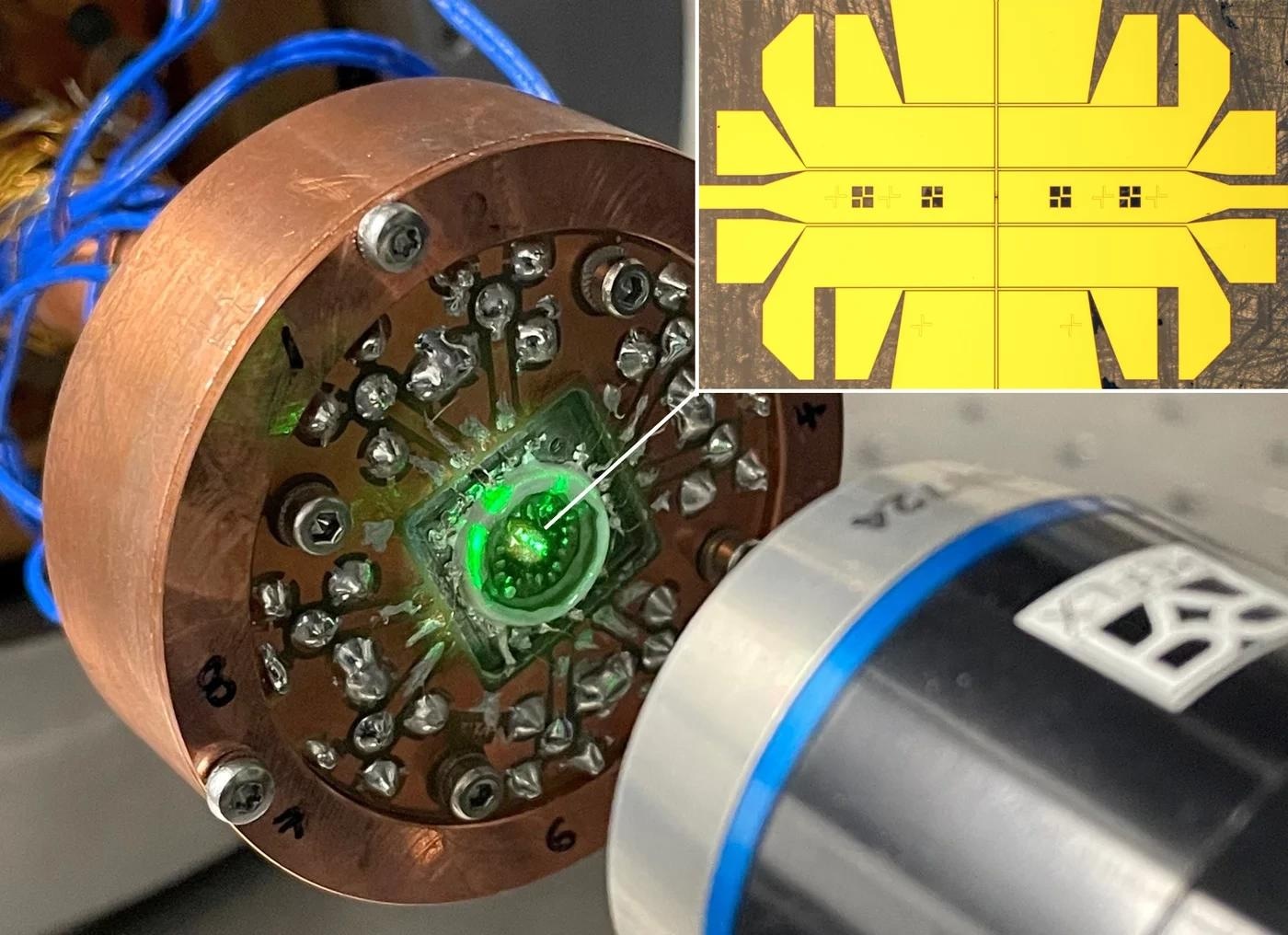The ability to activate superconductivity with a laser beam has been established before, and MPSD researchers have shown that this capability can be incorporated on a chip, paving the way for optoelectronic applications. Their study, which was published in Nature Communications, further shows that the photo-excited K3C60 sample has a nonlinear electrical response, meaning that the resistance of the sample is dependent on the applied current.

Measurement setup, in which mid-infrared and visible beams are focused onto the optoelectronic device. Insert: Image of the device on which picosecond current pulses are launched, transported and detected. Image Credit: Eryin Wang, MPSD
This is a fundamental aspect of superconductivity that offers fresh insights into the physics of K3C60 thin films and supports some of the earlier findings.
A primary area of study for the MPSD is the optical modification of materials to create superconductivity at high temperatures. Thus far, this approach has shown promise in several quantum materials, such as cuprates, k-(ET)2-X, and K3C60. Studies on the optically induced states in these materials have previously shown enhanced electrical coherence and vanishing resistance.
The goal of this study was to explore the field of picosecond transport measurements using on-chip non-linear THz spectroscopy (a picosecond is a trillionth of a second). They used co-planar waveguides to link K3C60 thin films to photo-conductive switches. They transmitted a powerful electrical current pulse through the material that lasted only one picosecond, using a visible laser beam to activate the switch.
The current pulse passed through the solid at around half the speed of light before arriving at a second switch, which acted as a detector to reveal crucial details like the distinctive electrical signatures of superconductivity.
The K3C60 films were simultaneously exposed to mid-infrared light, which allowed the researchers to see variations in the optically excited material’s nonlinear current. The two main characteristics of superconductors are the Meissner effect and this so-called critical current behavior.
This evidence of critical current behavior in the excited solid is particularly important, though, since neither has been measured up to this point. In addition, the group found that K3C60’s optically driven state resembled a granular superconductor, which is made up of weakly connected superconducting islands.
The MPSD is in a unique position to perform these types of measurements at the picosecond scale because its on-chip setup was created in-house.
We developed a technique platform which is perfect for probing non-linear transport phenomena away from equilibrium, like the non-linear and anomalous Hall effects, the Andreev reflection and others.
Eryin Wang, Study Lead Author and Staff Scientist, Max Planck Institute for the Structure and Dynamics of Matter
Furthermore, novel technologies based on this effect might result from the incorporation of non-equilibrium superconductivity onto optoelectronic platforms.
This work underscores the scientific and technological developments within the MPSD in Hamburg, where new experimental methods are constantly being developed to achieve new scientific understanding. We have been working on ultrafast electrical transport methods for nearly a decade and are now in a position to study so many new phenomena in non-equilibrium materials, and potentially to introduce lasting changes in technology.
Andrea Cavalleri, Director, IMPRS Faculty, Max Planck Institute for the Structure and Dynamics of Matter
The MPSD at the Center for Free-Electron Laser Science (CFEL) in Hamburg, Germany, is home to the research that yielded these findings.
Journal Reference
Wang, E., et al. (2023) Superconducting nonlinear transport in optically driven high-temperature K3C60. Nature Communications. doi:10.1038/s41467-023-42989-7